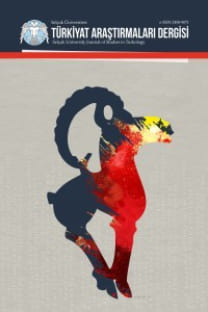Osmanlılar ile Anadolu Beylikleri Arasındaki İlişkilerde Ulemânın Diplomatik Rolü
Teşkilât ve müesseselerde Selçuklu geleneğinin hâkim olduğu Anadolu Beylikleri ve Osmanlılarda,ulemânın hizmet alanı içinde tedrisat, kaza ve telifâtla ilgili faaliyetler, ağırlıklı bir yeresahipti. Bununla birlikte gerek Anadolu Beylikleri, gerekse Osmanlılar, önceki teamüllerin deetkisiyle bu zümreden diplomasi alanında da faydalanma yoluna gittiler. Ulemânın bu alandatercih edilmesinin temel nedeni, hem siyasî çevreler, hem de toplum nazarında belli bir itimatve saygınlığa sahip bulunmasıyla ilgilidir. Osmanlılarla Beylikler arasındaki siyasî meselelerindiplomasi kanalıyla çözümünde elçilikle görevlendirilen ulemâ, taraflar arasında barışın tesisive anlaşma zemininin hazırlanmasında önemli rol oynamıştır. Bu resmî görevinin yanında,zaman zaman kendi inisiyatifi doğrultusunda üstlendiği arabuluculuk misyonuyla yine, barışınsağlanması yönünde kayda değer katkılarda bulunmuştur.
Anahtar Kelimeler:
Osmanlılar, Anadolu Beylikleri, Ulemâ, Diplomasi, Elçilik
The Diplomatic Role of Ulama in the Relations Between the Ottoman and Anatolian Beyliks
In the Ottoman and Anatolian Beyliks dominated by the Seljuk tradition in terms of organization and institutions, the ulama (scholars) mostly worked in the areas of teaching, judicial activities and book writing. Besides, both the Ottomans and Anatolian Beyliks used the scholars in the area of diplomacy. The main reason for their use as a diplomatic mission can be attributed to their popularity and respect among the population as well as the rulers. The ulama charged with diplomatic mission to solve the problems between the Ottoman and Beyliks played a significant role in establishing peace and realizing agreement. Along with such official mission, the ulama sometimes adopted a voluntary role to mediate between the conflicting parties and made significant contributions to peace and cooperation.
Keywords:
The Ottomans, Anatolian Beyliks, Ulama (Scholars), Diplomacy, Ambassadorship,
- ISSN: 1300-5766
- Yayın Aralığı: Yılda 3 Sayı
- Başlangıç: 1994
- Yayıncı: Selçuk Üniversitesi
Sayıdaki Diğer Makaleler
XX. Yüzyıl Başlarında Menteşe Sancağı Hapishaneleri
Lefkoşe Kalesinin Fethini İlk Elden Anlatan Mühim Bir Mektup
V. Mennanov, G. Astanova, Ş. Kemâliddin, Ämir Temür'ning Türkiy Yårlıġı, Taşkent 2005, 52 s.
Türk Keman Okulunun Oluşum Süreci ve Temsilcileri
"İpäk Yoli Äfsånäläri"nin Tasnifi
"Mir İslama" Dergisine Göre 20. Asır Başında İdil-Ural Bölgesinde Mektep ve Medrese Meselesi
Biçim ve Usûl Açısından Abdülkâdir Merâgî'nin Kârları
